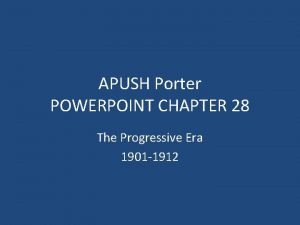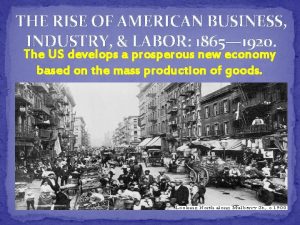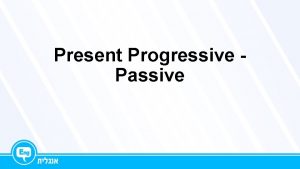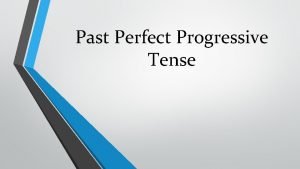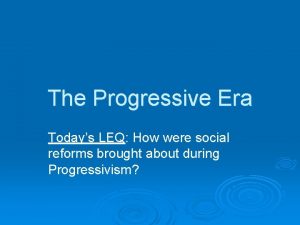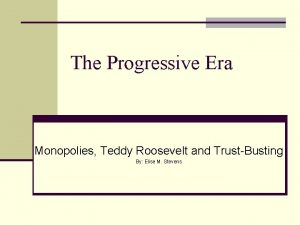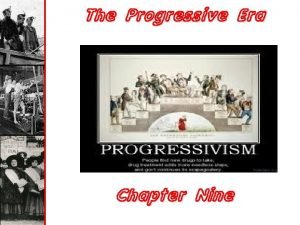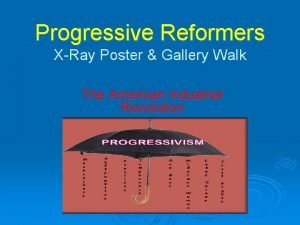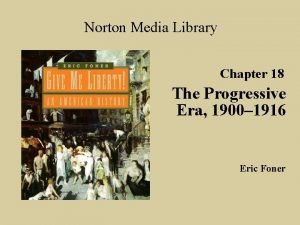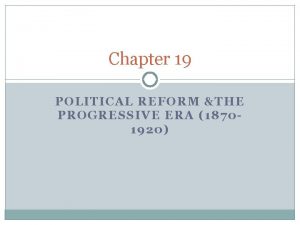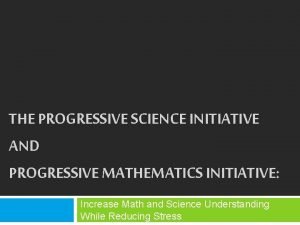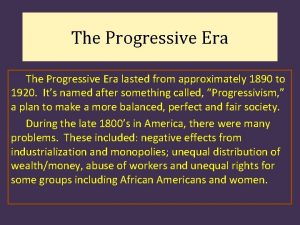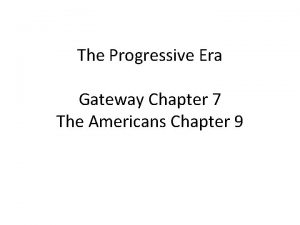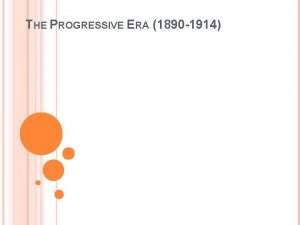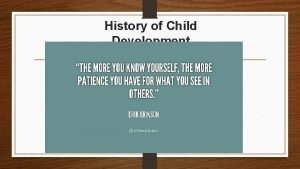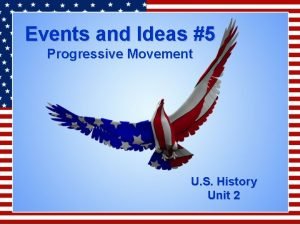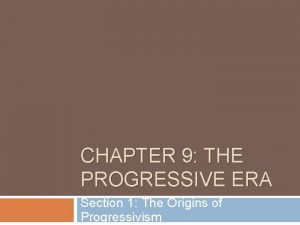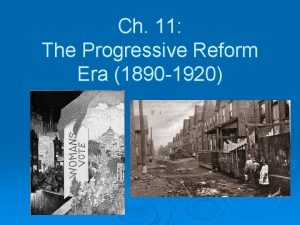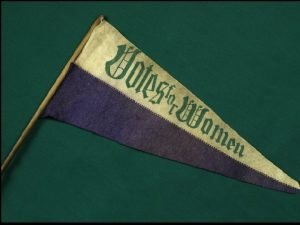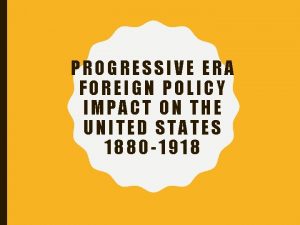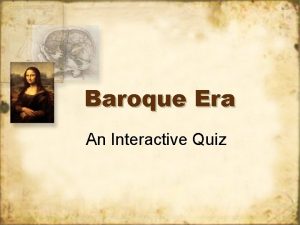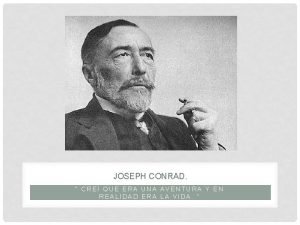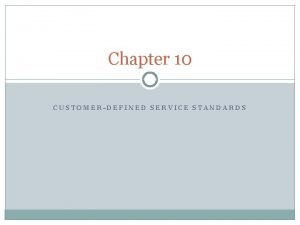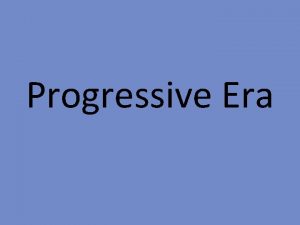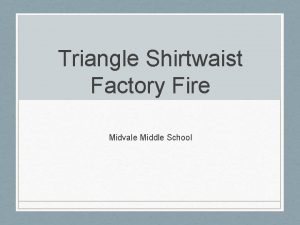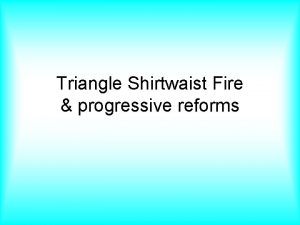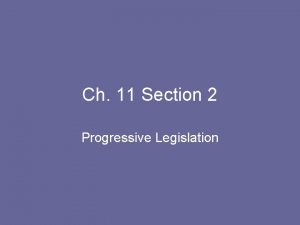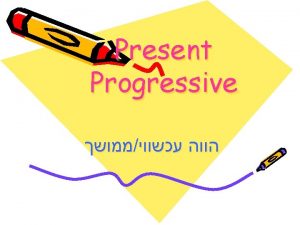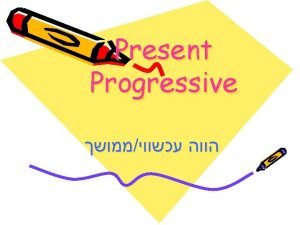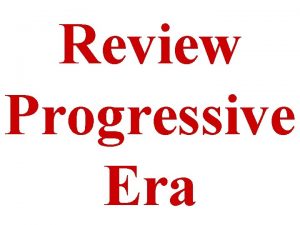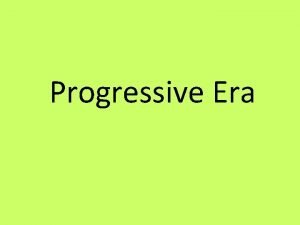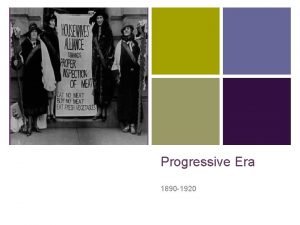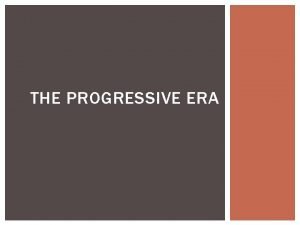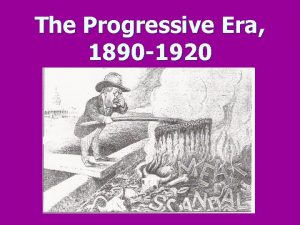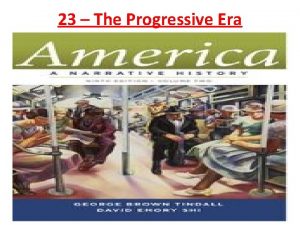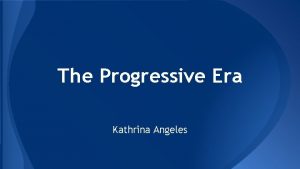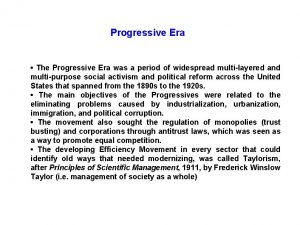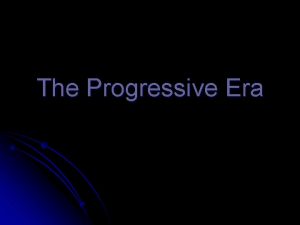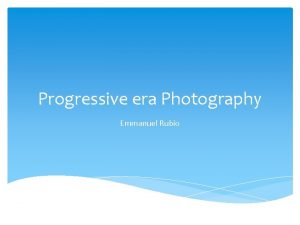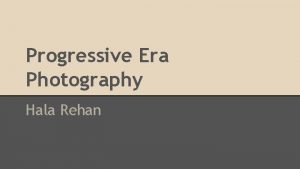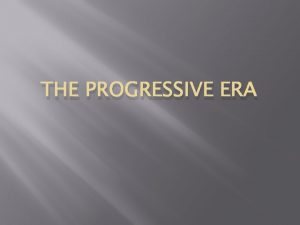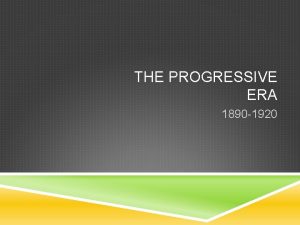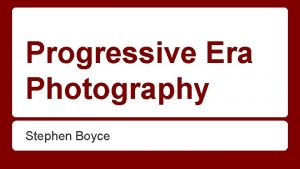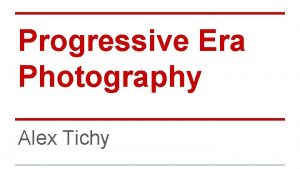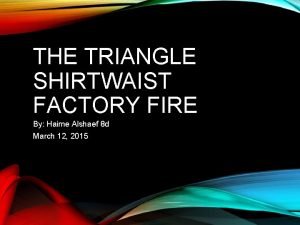THE PROGRESSIVE ERA Standards 10 30 TRIANGLE SHIRTWAIST








































- Slides: 40

THE PROGRESSIVE ERA Standards 10 -30

TRIANGLE SHIRTWAIST FACTORY

10 SOCIAL DARWINISM VS SOCIAL GOSPEL • Social Darwinism • Belief that individuals, groups, and peoples are subject to the same Darwinian laws of natural selection as animals and plants. • Late 1800 s/early 1900 s • Used to justify: • Imperialism • Conservatism • Racism

10 SOCIAL DARWINISM • Herbert Spencer • Coined “Survival of the Fittest”

10 SOCIAL GOSPEL • Protestant intellectual movement in early 1900 s that called for personal conversion AND social reform • Influenced the Progressive Movement • Walter Rauschenbusch • Washington Gladden

10 SOCIAL GOSPEL • Jane Addams and Hull House • Jacob Riis: How the Other Half Lives

BOOKER T. WASHINGTON VS. W. E. B. DUBOIS 11 DISAGREED ON STRATEGIES FOR BLACK SOCIAL & ECONOMIC PROGRESS The Negro Problem The Souls of Black Folks

12 GRANGER MOVEMENT • Following the Civil War • Coalition of U. S. farmers • Fought monopolistic grain transport practices • What drew most farmers to the Granger movement was the need for unified action against the monopolistic railroads and grain elevators (often owned by the railroads) that charged exorbitant rates for handling and transporting farmers’ crops and other agricultural products. • Oliver Hudson Kelley • Founded: 1867 Patrons of Husbandry

BANKING REFORM • Panic of 1907 • Federal Reserve Act: 1917 • Remember J. P. Morgan

GRADUATED INCOME TAX


13 RISE OF TRUSTS & MONOPOLIES • Sherman Anti-Trust Act of 1890 -p. 544 • Passed overwhelmingly in both houses • What’s a monopoly? • What’s a trust? • the exclusive possession or control of the supply or trade in a commodity or service. • a relationship in which one person holds title to property, subject to an obligation to keep or use the property for the benefit of another. • corporate trust is an American English term for a large business with significant market power. It is often used in a historical sense to refer to monopolies or near-monopolies in the United States during the Second Industrial Revolution in the 19 th century and early 20 th century.

LABOR: WOMEN AND CHILDREN


15 LABOR MOVEMENT • Rose in response to working conditions/issues • Samuel Gompers-pg. 553 • 1 st leader (founder) AFL • Promoted collective bargaining

15 LABOR MOVEMENT • Eugene Debs • IWW-Industrial Workers of the World (Wobblies) • 1905 -Chicago • 5 time candidate for Socialist Party of America (1900, 1904, 1908, 1912, 1920) Role in Pullman Strike

DO NOW • To begin your notes, use your phone or textbook to research the term muckraker. Define it. • Based on this definition, how do you view the work they did/do? Good? Bad? Helpful? , etc. (opinion) Explain.

HAYMARKET AFFAIR • May 1886 • Labor demonstration in Haymarket Square in Chicago-pg. 552 -553 • May 1 International Labor Day 15

COAL CREEK LABOR SAGA • Tennessee! • Coal mine owners replaced workers with prisoners leased out by the state govt. • Armed labor uprising • Eventually the practice stopped 15

G • blacklisting SHOPS BLACKLISTIN OPEN VS CLOSED • Open vs. closed shops • Open: membership in a union not required • Closed: membership in a union is required 15

16 MUCKRAKERS & PROGRESSIVES • Muckraker: researches and publishes allegations of corruption among politicians and/or business leaders • 1906 speech by Theodore Roosevelt • Robert La Follette-pg. 661 • Ran in 1924 for President in Progressive Party • Proponent of Progressivism: supporting social reform • Was against: WWI, trusts/monopolies/League of Nations

16 IDA TARBELL • Leading muckraker (late 1800 s/early 1900 s) • Pioneered investigative reporting • Standard Oil was her target • The History of the Standard Oil Company • She depicted John D. Rockefeller as crabbed, miserly, money-grabbing, and viciously effective monopolizing the oil trade at

DO NOW • Get out the Ida Tarbell reading from yesterday: “The History of the Standard Oil Company” • Address the following questions • 1. What was just one thing Tarbell says Rockefeller did to “drive out rivals”? • 2. Tarbell says, “We are a commercial people…. . ”. How does she describe business success in America? • 3. The last page summarizes the Supreme Court case Standard Oil Company of New Jersey et al v. United States. What was the opinion of the court? (what did it uphold? ) and what year was the case?

LINCOLN STEFFENS • The Shame of the Cities • 1904 • Investigated corruption in city governments • “In a country where business is dominant, business men must and will corrupt a government. ”

• Now, the typical American citizen is the business man. The typical business man is a bad citizen; he is busy. If he is a “big business man” and very busy, he does not neglect, he is busy with politics, oh, very busy and very businesslike. I found him buying boodlers in St. Louis, defending grafters in Minneapolis, originating corruption in Pittsburgh, sharing with bosses in Philadelphia, deploring reform in Chicago, and beating good government with corruption funds in New York. He is a self-righteous fraud, this big business man. He is the chief source of corruption, and it were a boon if he would neglect politics. But he is not the business man that neglects politics; that worthy is the good citizen, the typical business man. He too is busy, he is the one that has no use and therefore no time for politics. When his neglect has permitted bad government to go so far that he can be stirred to action, he is unhappy, and he looks around for a cure that shall be quick, so that he may hurry back to the shop.

• Naturally, too, when he talks politics, he talks shop. His patent remedy is quack; it is business. “Give us a business man, ” he says (“like me, ” he means). “Let him introduce business methods into politics and government; then I shall be left alone to attend to my business. ” There is hardly an office from United States Senator down to Alderman in any part of the country to which the business man has not been elected; yet politics remains corrupt, government pretty bad, and the selfish citizen has to hold himself in readiness like the old volunteer firemen to rush forth at any hour, in any weather, to prevent the fire; and he goes out sometimes and he puts out the fire (after the damage is done) and he goes back to the shop sighing for the business man in politics. The business man has failed in politics as he has in citizenship. Why? Because politics is business.

UPTON SINCLAIR • The Jungle • 1906 • Set out to expose

• There would be meat that had tumbled out on the floor, in the dirt and sawdust, where the workers had tramped and spit uncounted billions of consumption germs. There would be meat stored in great piles in rooms; and the water from leaky roofs would drip over it, and thousands of rats would race about on it. It was too dark in these storage places to see well, but a man could run his hand over these piles of meat and sweep off handfuls of the dried dung of rats. These rats were nuisances, and the packers would put poisoned bread out for them; they would die, and then rats, bread, and meat would go into the hoppers together. This is no fairy story and no joke; the meat would be shoveled into carts, and the man who did the shoveling would not trouble to lift out a rat even when he saw one – there were things that went into the sausage in comparison with which a poisoned rat was a tidbit.


DO NOW • What do you think “Walk softly but carry a big stick” means? Write 3 -5 sentences.

16/19 THEODORE ROOSEVELT • 26 th president (after President Mc. Kinley died) • 1901 -1909 • Republican. Driving force of Progressive Era. • 1912: Bull Moose Party • Promised fairness • Broke trusts trust busting • Established consumer protection laws: Food and Drug Act (led to the Food & Drug Administration), Federal Meat Inspection Act (remember Upton Sinclair)

19 THEODORE ROOSEVELT • 1905: Nobel Peace Prize • “Walk Softly but carry a big stick” • Square Deal: Roosevelt’s domestic program • The 3 Cs! • Conservation of resources • Control of corporations • Consumer protection

• “It is not the critic who counts; not the man who points out how the strong man stumbles, or where the doer of deeds could have done them better. The credit belongs to the man who is actually in the arena, whose face is marred by dust and sweat and blood; who strives valiantly; who errs, who comes short again and again, because there is no effort without error and shortcoming; but who does actually strive to do the deeds; who knows great enthusiasms, the great devotions; who spends himself in a worthy cause; who at the best knows in the end the triumph of high achievement, and who at the worst, if he fails, at least fails while daring greatly, so that his place shall never be with those cold and timid souls who neither know victory nor defeat. ”

17 INITIATIVE Procedure whereby a certain number of voters may, by petition, propose a law or constitutional amendment and have it submitted to the voters

REFERENDUM • A state-level method of direct legislation that gives voters a chance to approve or disapprove proposed legislation or a proposed constitutional amendment • California Proposition 64, the California Marijuana Legalization Initiative, was on the November 8, 2016, ballot in California as an initiated state statute. Supporters referred to the initiative as the Adult Use of Marijuana Act. It was approved. • A "yes" vote supported legalizing recreational marijuana for persons aged 21 years or older under state law and establishing certain sales and cultivation taxes. • A "no" vote opposed this proposal to legalize recreational marijuana under state law and to establish certain sales and cultivation taxes

RECALL • election (also called a recall referendum or representative recall) is a procedure by which voters can remove an elected official from office through a direct vote before that official's term has ended

PRIMARY SYSTEM

16 TH AMENDMENT • The Congress shall have power to lay and collect taxes on incomes, from whatever source derived, without apportionment among the several States, and without regard to any census or enumeration. • (passed by Congress: 1909; ratified: 1913)

17 TH AMENDMENT • The Senate of the United States shall be composed of two Senators from each State, elected by the people thereof, for six years; and each Senator shall have one vote. The electors in each State shall have the qualifications requisite for electors of the most numerous branch of the State legislatures.

CLOSING • Looking at your 16 th and 17 th Amendments, along with the other achievements of the Progressive Movement and progressives, what do you THINK was the impact on the relationship between the citizen and the government? (do this at the end of your notes)
 Triangle shirtwaist fire jumpers
Triangle shirtwaist fire jumpers Apush chapter 28
Apush chapter 28 Triangle shirtwaist factory fire led to which reforms
Triangle shirtwaist factory fire led to which reforms The triangle shirtwaist factory fire commonlit answer key
The triangle shirtwaist factory fire commonlit answer key Present progressive passive.
Present progressive passive. Simple past tense and past progressive
Simple past tense and past progressive Present perfect functions
Present perfect functions Progressive era leq
Progressive era leq What are mukrakers
What are mukrakers Trust busting progressive era
Trust busting progressive era What scandalous practices did upton
What scandalous practices did upton Progressive era posters
Progressive era posters Give me liberty chapter 18
Give me liberty chapter 18 Chapter 19 political reform and the progressive era
Chapter 19 political reform and the progressive era Initiative progressive era definition
Initiative progressive era definition The progressive era lasted from
The progressive era lasted from Gateway to us history chapter 7 the progressive era
Gateway to us history chapter 7 the progressive era Promoting moral improvement
Promoting moral improvement John dewey progressive era
John dewey progressive era Progressive era worksheets
Progressive era worksheets Chapter 9 the progressive era section 1 answers
Chapter 9 the progressive era section 1 answers Chapter 11 the progressive reform era
Chapter 11 the progressive reform era Anne dallas dudley
Anne dallas dudley Progressive era foreign policy
Progressive era foreign policy Wizard of oz progressive era
Wizard of oz progressive era 8th grade history staar test review games
8th grade history staar test review games Era quiz: the baroque era
Era quiz: the baroque era Victorian era vs elizabethan era
Victorian era vs elizabethan era Creí que era una aventura y en realidad era la vida
Creí que era una aventura y en realidad era la vida Era uma estrela tão alta era uma estrela tão fria
Era uma estrela tão alta era uma estrela tão fria Factors determining service standards
Factors determining service standards Hát kết hợp bộ gõ cơ thể
Hát kết hợp bộ gõ cơ thể Lp html
Lp html Bổ thể
Bổ thể Tỉ lệ cơ thể trẻ em
Tỉ lệ cơ thể trẻ em Chó sói
Chó sói Tư thế worm breton là gì
Tư thế worm breton là gì Bài hát chúa yêu trần thế alleluia
Bài hát chúa yêu trần thế alleluia Kể tên các môn thể thao
Kể tên các môn thể thao Thế nào là hệ số cao nhất
Thế nào là hệ số cao nhất Các châu lục và đại dương trên thế giới
Các châu lục và đại dương trên thế giới

